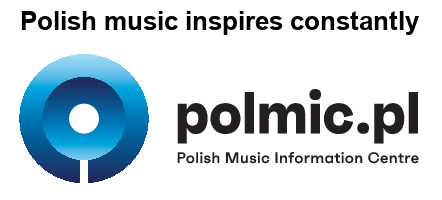Kornowicz Jerzy
-
promoter, composer, performer
composer, piano improviser, music animator, promoter of culture, b. 12th August 1959 in Lublin. He studied composition with Tadeusz Baird and Marian Borkowski at the Academy of Music (now - the Fryderyk Chopin University of Music) in Warsaw and with Louis Andriessen in the Royal Conservatory of The Hague. He participated in international courses for composers in, among others, Kazimierz, Darmstadt and Villenueve-lez-Avignon and received scholarships from the Dutch government, the Foundation of Culture and the British Council, among others.
Jerzy Kornowicz’s works have been written on commission from festivals, institutions and eminent musicians from Poland and abroad, such as the BBC Radio, the Polish Radio, the Experimental Studio of the Polish Radio, BBC Singers, the “Warsaw Autumn” Festival, De Ereprijs orchestra, Joachim Quartet, Prague Philharmonic and the City of Wrocław. His compositions have been included in the repertoires of such musicians as Elżbieta Chojnacka (the “Orpheus” Award of Polish critics for The Shapes of the Elements at the “Warsaw Autumn”), Jerzy Maksymiuk, Krzysztof Bąkowski, New Music Orchestra, Polish National Radio Symphony Orchestra, Leopoldinum and Wratislavia orchestras, Polish Chamber Orchestra, AUKSO, Weltblech, Melos Ethos Ensemble and the Schola Cantorum Gedanensis. His music has been presented at the “Warsaw Autumn”, the ISCM World Music Days, BBC Radio Festival, festivals in Middelburg, Cheltelham, Paris, Lille, Bucharest, Minsk, Kiev, Odense, New York and Tokyo, among others, and released on CDs by BBC Music, Signum Classics, Acte Préalable and the Polish Music Information Centre. In 2000 his Interwoven Figures was a recommended piece at the International Rostrum of Composers; in 2008 his Build-ups for orchestra was one of the seven works nominated for the Public Media Award Opus 2008; in 2014 his Great Spinning was shortlisted in the finals of the 1st Wrocław Music Award “Polonica Nova”.
Kornowicz is the founder of the “Mud Cavaliers” intuitive music group, which brings together improvising composers and authors of alternative and jazz music. With this formation he has appeared at such festivals as: Chopin and His Europe, Musica Polonica Nova, the “Warsaw Autumn”, “Audio Art” in Cracow, “Audio Art” in Warsaw, and Warsaw Music Encounters. He has also written music for children, for the theatre and film, as well as popular songs.
In 1988-90, Jerzy Kornowicz was the chairman of the Polish Composers’ Union Youth Circle, in 1989-92 and 2002-07 – member of the Managing Board of the International Society for Contemporary Music, Polish Section. In 2004-06 he held the position of Vice-President of the Minister of Culture’s Non-Governmental Organisations Council, He co-organised the 2nd and 3rd Gdańsk Encounters of Young Composers “Droga” (1989, 1991), co-initiated the “Akordy” series in Lublin, and the “Generations” concert series at the Polish Radio. He was also the artistic curator of the “Audio Art” festival in Warsaw and the “Spaces of Sound” at the Centre for Contemporary Art – Ujazdowski Castle in Warsaw, as well as the initiator of the “Academy of Sounds” educational concert series dedicated to new music, presented at Warsaw’s schools. He is the artistic curator of the “Codes” Festival of Traditional and Avant-garde Music in Lublin, author and organiser of the annual event for free sound enthusiasts “All-Polish Collection of Brand New and Second-Hand Sounds” (since 2004).
Jerzy Kornowicz was a co-founder of the European Composers' Forum in Vienna, as well as the European Composer and Songwriter Alliance in Brussels. He served on the juries of national and international competitions for composers, including the Witold Lutosławski Competition in Warsaw, the Grzegorz Fitelberg Competition in Katowice and the Karol Szymanowski Competition in Warsaw. He has lectured at the Maria Curie-Skłodowska University in Lublin, and has appeared as a guest lecturer at other Polish and foreign universities. Since 1994 he has developed his own original music education syllabus at schools operated by the Association for Culture and Education in Warsaw.
The composer has been actively involved in promoting the presence of music in public space, the awareness of music, access to artistic creations and to culture as a constituent of individual and social identity. He was one of the initiators of the Institute of Music and Dance, the Polish Music Convention, the programme of commissions for new music and online access to musical works. At present he is involved in the development of instruments for access to music recordings and publications, which are designed to bridge the enormous gap resulting from the topic being neglected by state institutions. Jerzy Kornowicz advocates a model of Polish culture as a public and communal enterprise, with a powerful though controlled and non-autonomous presence of the state.
Between 2003 and 2015 Jerzy Kornowicz held the post of President of the Polish Composers’ Union. Since 2013 he is also the President of “Creative Poland” association, which brings together Polish artists and creative industries. He is also the vice-President of the Music Programme Board of the Institute of Music and Dance. As of 2017, he will take over the position of director of the "Warsaw Autumn" International Festival of Contemporary Music.
In 2005 he was awarded the Gloria Artis Medal for Merit to Culture, in 2008 – the ZAiKS Polish Society of Authors and Composers Award for his contributions to the promotion of Polish music, and in May 2014 – the Cavalier’s Cross of the Polonia Restituta Order.
updated: 2016 (Izabela Zymer)
Creation
Born in 1959, Jerzy Kornowicz belongs to a generation which treats the musical tradition in a much bolder way than the previous one, sometimes even rejecting the tradition again. The earlier generation, reacting against the 1950s and 1960s avant-garde, drew on tradition in a manner which has been described as the postmodernist style. In this context, Kornowicz could be defined – especially with regard to some of his works, such as Coma Berenices for piano, Interwoven Figures for chamber ensemble, or The Shapes of the Elements for harpsichord and tape – as a post-postmodernist. In this music, there is no neo-Romantic emotion, no neo-Classical turns in the cadence, no neo-Baroque rhythmic formulas, only a free interplay of imagination and sound. But Kornowicz does not approach the musical material with the purist attitude of the avant-garde. He treats the material rather freely, mixing different styles, aesthetics and sources of sound, and in this treatment he comes close to the postmodernist stance.
Another “postmodernist” element in Kornowicz’s work as a composer is his openness to various musical genres and kinds, including those which cannot be classified as “classical music”. He writes for the theatre and film, as well as songs and illustrations for literary-musical radio broadcasts. His pieces were performed at the Festival of Polish Song in Opole and the Gala of Actor’s Songs in Wrocław. He composes for the experimental theatre and computer animation, to mention such works as Renesis for sounds of nature and the electrostatic shadows and stained-glass windows from Tadeusz Wierzbicki’s Laboratory of Phenomena.
He is also an active music teacher and organiser of musical events: co-founder of the Gdańsk Encounters of Young Composers “The Road”, co-organiser of the Laboratories of Contemporary Chamber Music in Stara Wieś, the International Society for Contemporary Music, Polish Section International Summer Courses for Young Composers, concerts of the Polish Composers’ Union Youth Circle, member of the Polish Composers’ Union Concert Committee, author of concert programmes for ZAiKS Authors’ Association.
Compositions
- Interactions for six percussionists (1982)
- Transmission for solo piano (1983)
- Written in Poland for tape (1984)
- Harmonikos for orchestra (1984)
- Tibet I for tape (1985)
- Totale for orchestra (1985)
- Off Reduction for solo violin (1986)
- Tukuang – A Plateau of Phoenixes for 5-octave marimbaphone (1987)
- Fractus for solo double-bass (1988)
- The Round for 3 actors-percussionists (1988)
- Report for alto flute and electronic echo (1990)
- Coma Berenices for solo piano (1990)
- Little Pavan for violin and piano (1993)
- Breathing and Dust for chamber orchestra (1993)
- Pavanette for violin and piano (1993)
- Puzzler for chamber orchestra (1995)
- Ceaseless Spinning of Matter for solo violin (1996)
- Rollin’song for saxophone quartet (1997)
- Metanoia for harpsichord and tape (1998)
- Interwoven Figures for chamber orchestra (1998-99)
- Four Poems to texts by Czesław Miłosz for voice and piano (1999)
- The Shapes of the Elements for harpsichord and tape (sounds of nature) (2000)
- Waiting for mixed choir and speaking voices (2000)
- Build-ups for piano quintet (2001)
- Renesis for sounds of nature (2001)
- Charms for counter-tenor and mixed choir (2001)
- Luminosity for violin and piano (2001)
- The Ribbon of Purple - In the clutches of waltz for piano (2002)
- Four Streams for strings (2003)
- Dawns I – “Prague” for symphony orchestra (2004)
- Dawns II - Ereprijs for chamber orchestra (2004-2005)
- Dawns III - Weltblech for brass ensemble and percussion (2005)
- Dawns IV – Melos-Ethos for 15 performers (2006)
- Scenes from Infinity for instrumental ensemble, vocal ensemble and live electronics (2006)
- Build-ups for orchestra (2007)
- Two Songs to Texts of Chopin’s Songs for soprano and piano (2010)
- Scenes from Bulgakov for chamber orchestra and improvising computer (2010)
- Bells of Nielisz for two pianos (2011)
- Scenes from Bulgakov – “Minsk” for chamber orchestra and tape (2011)
- Oblivion Stones from the cycle Photographic Scores – version for photos and two pianos – improvised music to photos by Mariusz Wideryński, with Szabolcs Esztényi; concept of the series by: Ryszard Latecki and Mariusz Wideryński (2011)
- Metropolis – muzyka miasta for ensemble and audiovisual projections (2011)
- Bells of Saint- Acheul for two pianos and sampler (2012)
- The Hour of Metamorphoses – Echo, King Midas and the Swans– a musical expedition based on themes from Ovid’s Metamorphoses, edited by Anna Kamieńska (2012)
- Gullfoss, graphic music for bass clarinet, violin, piano and percussion (2012)
- Silence of Sounds – Towards Sz. E. for piano and live electronics (2013)
- Great Passage for symphony orchestra with concertante instruments (2013)
- Oto, intuitive audiovisual composition for Mariusz Wideryński's photographs, version for 4 improvising musicians and visual performer (2013)
- 60 seconds for the 60th anniversary for children's ensemble (2013)
- Nieustanne rzeczy wirowanie for 2 violas (2013)
- Great Spinning for big-band and soloists (2014)
- Historia Najmniej Prawdopodobna, opera in 3 acts and 11 spaces for a young audience (2015)
- Action for piano solo (2015)
- Extrema for 11 performers (2016)
- Two Pieces for piano quintet (2016)
- Two Spaces for 2 violins and string orchestra (2016)
- Epigrams for 2 flutes and chamber orchestra (2016-2017)
- Journey to the center of the Earth, a musical journey based on the novel by Julius Verne (2017)
- Scenes from Witkacy for string orchestra, ethnic instruments and words (2017)
- Murale for violin and symphony orchestra (2019)
- Spindles for harpsichord and chamber orchestra (2019)
- Window for string orchestra (2020)
- Transfiguracje - sceny liturgiczne for ensemble and electronics (2021)
- Album Rodzinny, chamber opera for 2 soloists, string orchestra and video to libretto by Michał Rusinek (2022)
- Massifs for two flutists and symphony orchestra (2023)
- Piano Quintet "Scenes from Bosch" (2024)
- Szczur i Drzewo, chamber ecological opera (2024)
Stage and film music
- Music for the play Pan Twardowski, dir. by Tadeusz Wierzbicki (1988)
- Music for the play Zakochany obłok, dir. by Tadeusz Wierzbicki (1994)
- Music for the play KALWERK, by Krystian Lupa (1995)
- Music for the play Być Królewną, dir. by Tadeusz Wierzbicki (1995)
- Music for the film ZEW, dir. by Piotr Włodarski (1996)
- Music for the play Podróże Sindabada, dir. by Beata Chwedorzewska (1999)
- Music for the play Alice in Wonderland, dir. by Beata Chwedorzewska (2000)
- Music for the play Szewczyk Dratewka, dir. by Dariusz Kunowski (2003)
- Music for the play Krzesiwo, dir. by Beata Chwedorzewska (2004)
- Music for the film Sierpniowe niebo, dir. by Ireneusz Dobrowolski (2004)
- Music for the play The Little Prince, dir. by Beata Chwedorzewska (2004)
- Music for the play Gulliver's Travels, dir. by Dariusz Kunowski (2008)
- Music for the play Lilije, dir. by Beata Chwedorzewska (2009)
- Music for the play Ferajna pana Dropsa, dir. by Dariusz Kunowski (2012)
- Music for the play Penelopiada, dir. by Beata Chwedorzewska (2012)
- Music for the play Piotruś Pan, dir. by Beata Chwedorzewska (2012)
- Music for the play Dżamble, dir. by Dariusz Kunowski (2013)
- Music for the play Leśne Głupki, dir. by Beata Chwedorzewska (2014)
- Music for the play Jakub i Brzoskwinka-Olbrzymka, dir. by Beata Chwedorzewska (2017)
- Music for the play Król i morze, dir. by Dariusz Kunowski (2018)
- Music for the play Pinocchio, dir. by Beata Chwedorzewska (2018)
- Music for the play Dziady II, dir. by Beata Chwedorzewska (2018)











